Life’s a Riot: Inside America’s Biggest Punk Festival
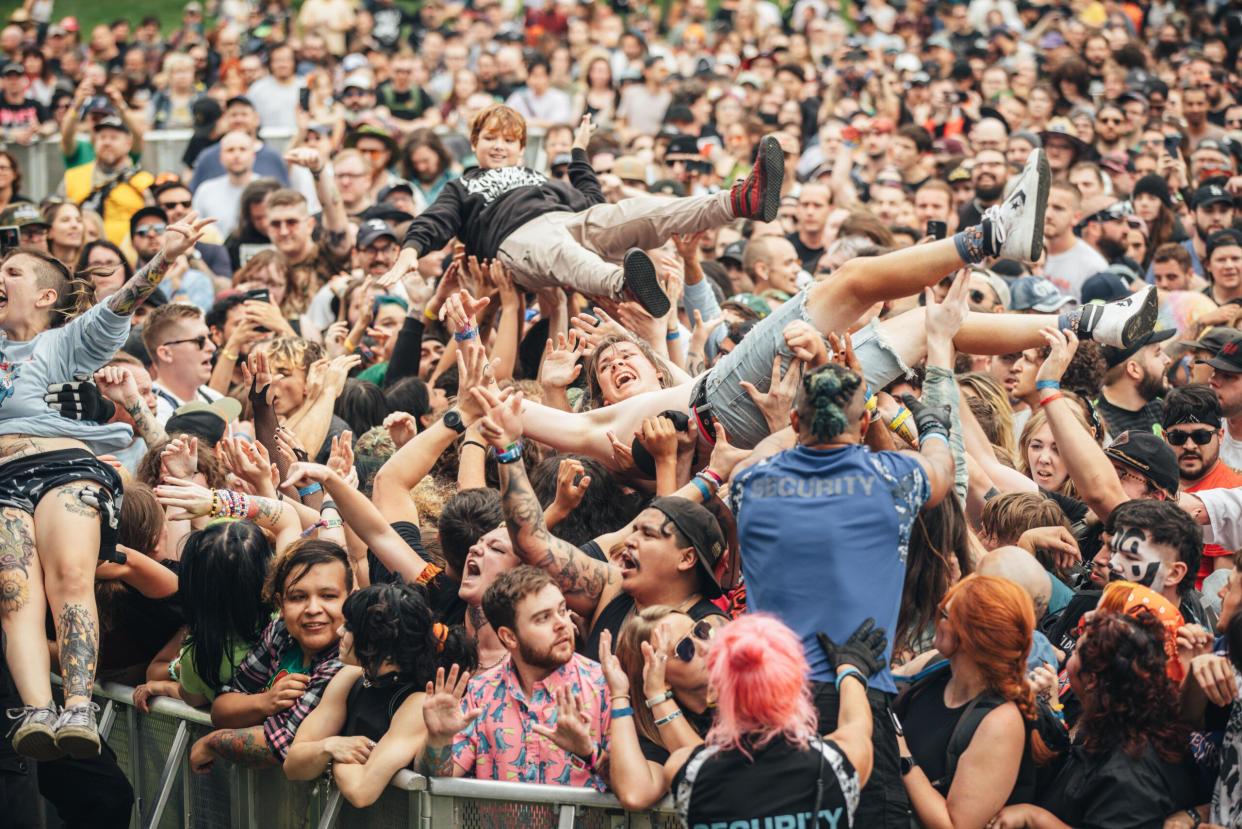
“I hope he brings out the chainsaws,” People photographer Ben Trivett says just before we visit “Riot” Mike Petryshyn in his Riot Fest compound on the edge of Chicago’s Douglass Park. “No, I’m serious.”
What were the chainsaws for? No one knows for sure. But among those in the know, the chainsaws are real, functional, and present for at least a few photoshoots.
More from Spin:
As we wind through the streets and walkways separating thousands of punks from the rest of Illinois — past the banks of port-a-potties, golf carts, and semi trucks — the Dresden Dolls’ cover of Black Sabbath’s “War Pigs” override the potential of hearing any chainsaw sounds from the Riot Fest founder.
But as we follow arrows pointing toward the “Champagne Room” (Petryshyn’s private compound) and approach a security guard standing in front of a nondescript gate, we see that this year, Petryshyn has opted to trade the chainsaws for a large, wood-splitting ax resting embedded in a pile of logs.
“What I love about being here is that you can hear the music from stages 1, 2, 4 and 5,” Petryshyn says. “Last night, we had the Postal Service, ICP (Insane Clown Posse), and Mr. Bungle all playing at the same time, and you know what? It worked.”
As Petryshyn lights the fire pit next to the bus doubling as his own private office/retreat from all of the chaos of running a major festival, his point is made as the Mars Volta’s Roots Stage performance overlapping with the first few chords of the Gaslight Anthem on the Rise Stage — a combination that no one would intentionally make, yet mingles surprisingly well.Underneath his slicked-back gray hair, Wayfarers, and white t-shirt/black jacket combo, Riot Mike exudes a quiet excitement. On one hand, it’s the most chaotic weekend of the year for the president of Riot Fest Music Co. — one where spending a half-hour to chat means missing an avalanche of messages that need addressing. But on the other, it’s his life’s work bringing joy to thousands of people, and he’s the glue holding his small, independent team together.
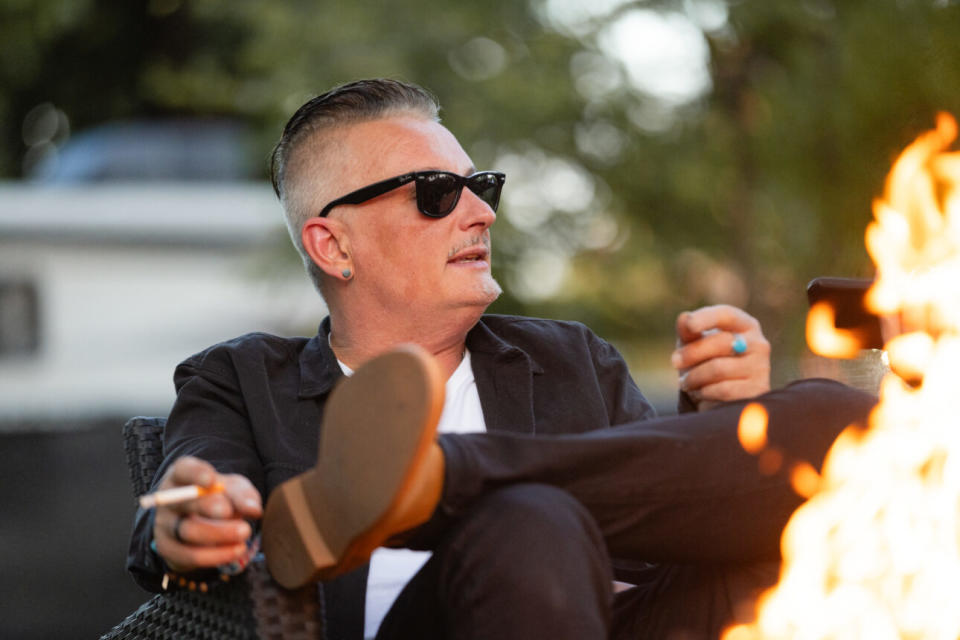
“It’s all about not wanting to cheat the fans, man,” Petryshyn tells SPIN, crossing one leg over the other while seated next to the fire. “There’s a bunch of introverts out there, so I’m talking to the same audience as me. Riot Fest is a festival that maybe I’d go to — maybe. I know our fans, because I’m one of them. I can tell when our stuff will get a positive response because we’re not manipulating them or pulling the wool over their eyes. We just do dumb shit and it relates to them because we think dumb shit is funny.”
That mentality has separated Riot Fest from its competitors since its 2005 inception. As the most prominent punk-leaning festival in the country that also has elements of alternative rock, hardcore/post-hardcore, hip-hop, goth, and other genres Riot Fest carries on the feel of Warped Tour more than modern festival culture. Attendees aren’t there to take selfies in their cutest outfits – they’re but a drop in a sea of band tees and black denim wandering across the grounds’ five stages and cursing their favorite bands being slotted at the same time.
Most of the artists also aren’t there to play a set, cash a check, and get out. The bar area in the artist compound looks like a time-traveling afternoon block of MTV2, with modern bands drinking with their middle-aged heroes, producers, and other VIPs. The sides of the stages are frequently lined with artists watching their friends play under an overcast afternoon sky. In the same way that the Warped Tour at its peak was “punk rock summer camp,” Riot Fest is a throwback to when “streams” referred to flowing liquid.
“We watched Thursday play today, and I had a couple of weird goosebump moments thinking about watching them from side stage in 2002 when they were so fucking cool,” the Used bassist Jeph Howard says. “Now we get to watch them play again while being friends. The whole vibe here is magic.”
“Going backstage and watching bands like we did on the Warped Tour is just a fucking magical experience,” adds vocalist Bert McCracken. “It’s so nostalgic going back to our wasted youth. It’s like a big family reunion.”
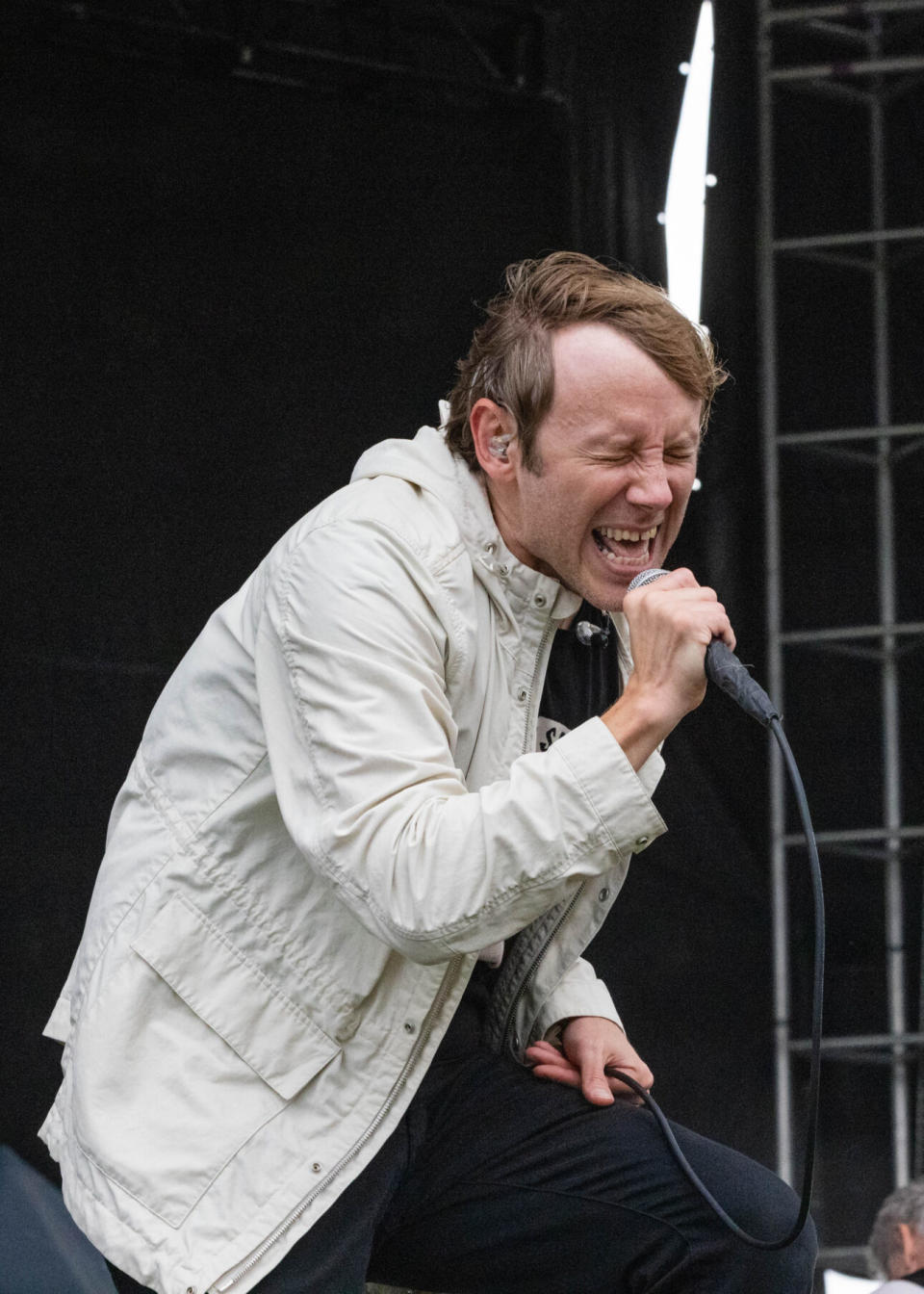
“It’s a very nice social background for people you haven’t seen in 20 years, but unlike Warped Tour, Riot Fest hasn’t changed,” Thursday’s Geoff Rickly says. “Where Warped Tour would chase one subgenre or another to follow whatever was blowing up, Riot Fest always feels like it leans into what they already do.”
“It’s the coolest American festival that we get to play,” Bayside drummer Chris Guglielmo says. “Kim Deal even called Jack [O’Shea, Bayside’s guitarist] a nerd today.” “Kelley Deal was walking around with a Stephen King shirt, and I was like [gestures to his own Stephen King shirt] ‘Yo, we’ve got to chat about this,’” O’Shea laughs. “We ended up talking about it, and Kim walked by and just goes ‘Dorks!’”
Passing interactions with the Breeders aside, many bands agree that Riot Fest is the one event that hasn’t changed for the worse as its scale has increased. While no one wants to throw Coachella under the bus, several artists point out that the Palm Springs-area mega-event started as an alternative festival. Yet as Riot Fest graduated from indoor venues to a massive public park, it stayed true to the bands and maintained its punk rock ethos. It’s a welcoming and comfortable place for weird punk/emo/hardcore/indie folks of all types — otherwise considered “the craft beer of punk festivals” to Say Anything’s Max Bemis and Alex Kent.
“We actually mentioned Riot Fest in our new song without knowing we were playing it this year — just because it’s so emblematic of a festival we’d play,” Bemis says. “We’re the stereotypical band for this festival, which is weird because we’re a weird band. We were the kooky indie kids at Warped Tour 15 years ago, and we’d be a total dark horse at Coachella for various reasons. It’s the coolest punk festival, and it stretches the definition of ‘punk’ in the way we do.”
Much of that welcoming nature comes from Petryshyn. The 45-year-old founder wasn’t interested in drawing divisions between genres growing up in the Buffalo punk rock scene. Instead, he’d draw his dream festival lineups on his school notebooks — a punk one headlined by the Sex Pistols, one for metal with Metallica, and a third made of hip-hop artists like the Beastie Boys.
Today, Petryshyn’s magnum opus contains artists from every corner of the “alternative” genre. It’s the only place to catch Foo Fighters, Parliament Funkadelic, Turnstile, and Eshu Tune (the hip-hop alter ego of actor and comedian Hannibal Buress). And while Buress’s musical career is still in its early stages, Riot Fest serves as a hometown show for an audience that otherwise might not even know he raps.
“A lot of festivals can look a little copy-and-paste based on who’s gonna be there, whereas [Riot Fest] has a lot of different folks that you wouldn’t expect,” Buress says. “There’s no one genre there.”
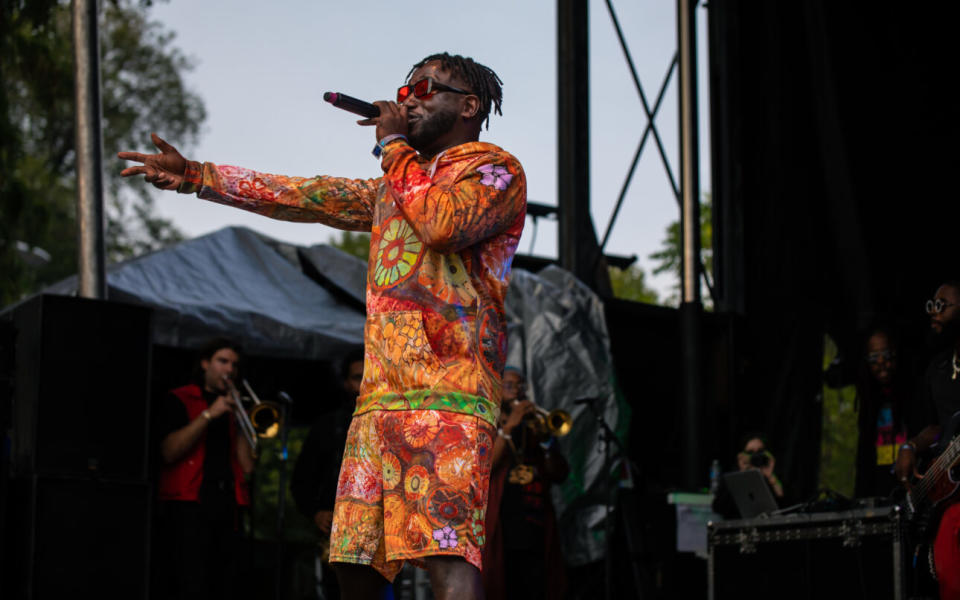
Aside from the variety, Riot Fest is also the place for special moments within the punk and underground rock worlds. Not only can fans get married at the wedding chapel, but legendary bands frequently renew their vows with reunions and full album playthroughs.
“There’s always some special reunion or something that you have to see,” LS Dunes/Circa Survive vocalist Anthony Green says. “I look forward to every year I get asked to play with any band. You always get to see so many friends and you know it’s going to be consistently good, but you’re also going to see things that you can’t see anywhere else. It’s my little vacation every September.”
How did Riot Fest take the baton as the reunion spot for everyone from the Misfits to the Replacements? It might not be directly related to Petryshyn’s early struggles to book major bands with their primary vocalists (the first year featured the Danzig-less Misfits, Jello-less Dead Kennedys, and the Germs minus the long-dead Darby Crash), but it does feel like some karma for keeping the festival going when things seemed bleak.
“I had this stigma of being the ‘no lead singer’ guy, but that’s all that was available that first year,” Petryshyn says. “I met Pat Smear that year and realized he was one of the nicest human beings ever, but I really felt like I could never do it again. I was living in a basement, I was 20 grand in debt, and all of my paychecks were going to this event that was causing me so much stress. I still don’t plan years ahead. If I ever stop having fun, I won’t do it anymore. But there’s always one moment — or several moments — every year that makes me want to do it again.”
If and when Petryshyn decides Riot Fest is no longer fun, it’s hard to see the fest continuing. Giants like Live Nation or Goldenvoice might be able to make it trendier, but Riot Fest thrives as the Basket Case of the festival world’s Breakfast Club.This year’s edition offered plenty of memorable moments for Petryshyn and attendees alike. Everyone from the Postal Service (Give Up) to Gorilla Biscuits (Start Today) played iconic albums in full, and although there were no one-off reunions at Riot Fest, Head Automatica and Balance and Composure made it one of the only festival dates on their reunion tours — an easy choice according to respective vocalists Daryl Palumbo and Jon Simmons.
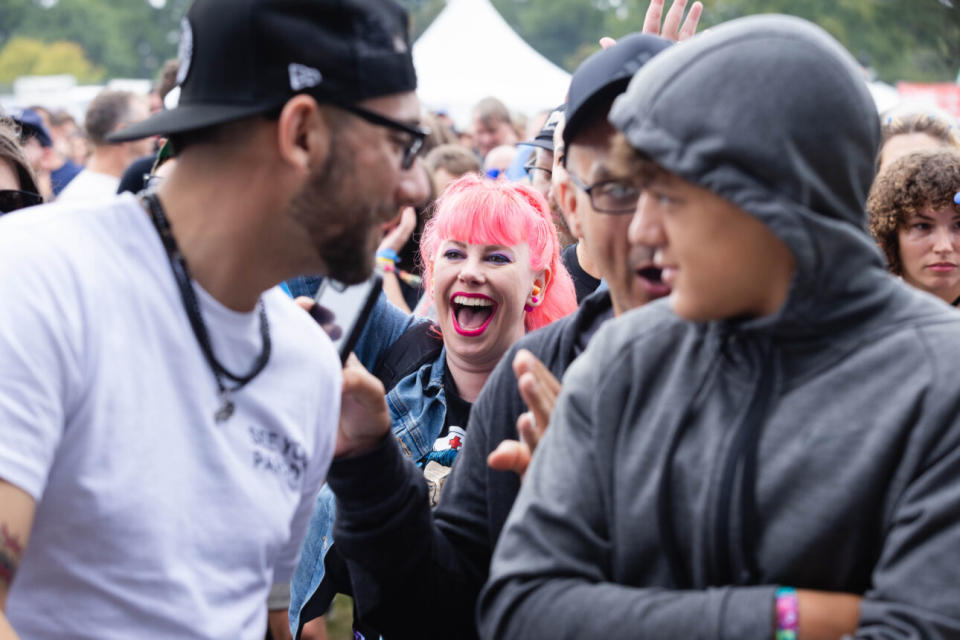
“It’s a punk-themed festival, but it runs the whole gamut of punk and metal and wild niches in our scene, which I think is important,” Palumbo says. “It covers the whole breadth of everything heavy and weird, from Death Grips and Insane Clown Posse to Head Automatica, fucking Quicksand, Gorilla Biscuits, and a million other hardcore bands. I just saw (Rocket From the Crypt/Hot Snakes guitarist) John Reis walking around backstage and was like ‘This is fucking wild.’”
“This was our favorite festival we ever played, so we just wanted to come back here and play it again,” Simmons says. “We always like the bands on it, and it’s just super comfortable and easy, whereas many festivals are hectic and chaotic. Also, it’s exactly the same as when we played in 2016, and it’s perfect that way. I would be mad if it changed.”
For other bands, it’s a place for new beginnings. Refused singer Dennis Lyxzén was approached by punk legend Brian Baker about singing for his new band back in 2016, and Fake Problems was born a matter of months later. The band’s bassist, Johnny Temple, fondly remembers watching the Specials for the first time that year, while Baker recalls a comical run-in with the reunited Misfits that could only happen at Riot Fest.
“I saw the Misfits from the side of the stage,” Baker says. “I basically ruined their whole show as this guy in bright white pants on the side, so it wasn’t spooky at all. Yet I’ve been invited back, despite that catastrophe.”
But it’s not just about legacy acts for Riot Fest. The festival gave the Interrupters a slot while they were on their first tour with Rancid, before they released an album or had merch to sell. Guitarist Kevin Bivona and bassist Justin Bivona joke about how unprepared they were for their first festival and wanting to break up for the sole purpose of reuniting at Riot Fest, while vocalist Aimee Interrupter is still beaming over this year’s main stage performance.
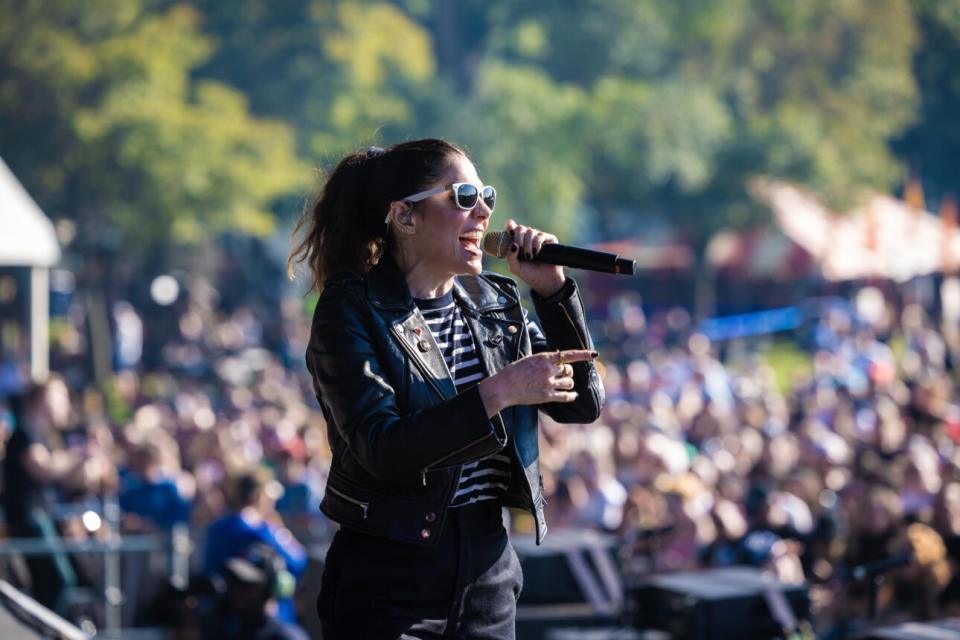
“There’s just such a vibe in the crowd that I was overwhelmed with gratitude,” she says. “They immediately had a circle pit going, and no one was too cool to clap their hands and sing along. Plus, today was our first show ever with a sign language interpreter, and I was blown away. I could not stop staring. It’s so beautiful and such an art form. And then I looked over at the side of the stage and Dave Grohl and Josh Freese are standing there.”
When asked what makes Riot Fest different for the bands that love it, Petryshyn says the one word the Interrupters know better than nearly anyone: “family.” Having recently revealed his autism diagnosis in an interview with the Chicago Sun-Times, Riot Mike now has a better understanding of why he felt more comfortable at punk shows than in any other social situation. It’s that sense of community he wants to extend to everyone who comes through the gates, and it makes bands ranging from the Cure to Code Orange want to play Riot Fest not just once, but repeatedly.
“We’ve been knocking on the door of Riot Fest trying to get in for a long time, so I’m glad they rolled the dice on us,” Code Orange drummer Jami Morgan says. “I love seeing Riot Fest including bands from our world alongside the other alternative music worlds, and I’m hoping we can keep breaking the door down to expand it in a heavier direction.”
And perhaps because Petryshyn didn’t come into it with any festival experience (he had no idea what a backline was when the Misfits asked him ahead of their performance at the debut incarnation), he’s created a music-first atmosphere that’s generally reserved for festivals happening across the Atlantic.
“When I was a kid in the U.K., you were either a Reading kid or a Glastonbury kid,” Frank Turner says. “If you’re a Glastonbury kid, you’re gonna go take drugs, hang out with cool people, and maybe see a few bands. If you’re a Reading kid, you had the fucking timetable two months before with a map of the festival and walking times added in. It was just all about the music, and that’s how Riot Fest always feels.”
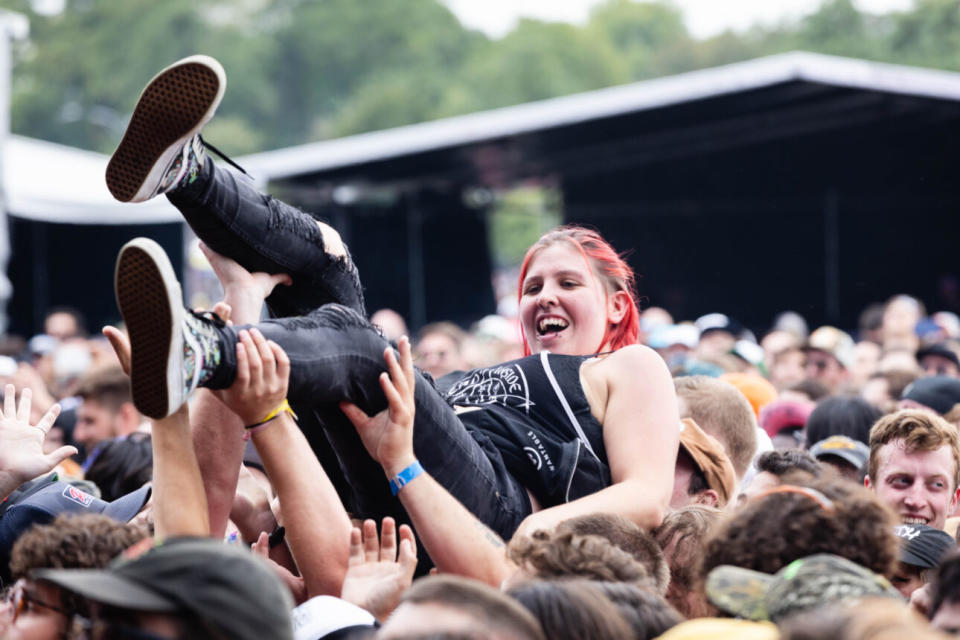
But that’s not saying Petryshyn’s home for more than two decades is fond of Riot Fest. The festival had to move from Humboldt Park to Douglass Park in 2015 due to local furor, and now its new neighbors have decried the event as well. The main complaints about the trash left behind and blocking off a public park are well-vocalized (and vulgarly scribbled as graffiti on its fences), but the festival does its best to both clean up after itself and give back to the community.
This year, that community immersion focus reached new heights with the “Beyond The Fest” initiative, which not only brought local artists onto the festival’s lineup but also included free workshops for local businesses, paid internships, a White Sox clinic, park cleanups, and more. The emphasis is on bringing the same community spirit from the punk rock world into the surrounding neighborhoods, regardless of musical preference.
And in some ways, that sense of community and inclusion all ties into arguably the biggest stars of the weekend. While the Postal Service may have technically been Saturday’s headliner, there was one artist that everyone and their face-painted mothers were talking about the entire day – the group that proved no matter your skin color or socioeconomic background, you can still be a Juggalo.
“We didn’t do festivals except for our own for like 20 years, because people didn’t understand what we did,” Violent J of Insane Clown Posse says. “If we did a festival like this in the ‘90s, there would have been 500-1000 juggalos up front, and the other 19,000 people would be like ‘Fuck you!’ We still don’t play a lot of festivals, but it’s an amazing feeling when you get a festival that breaks down the boundaries between our family and the festival crowd. We feel like we’re part of the club, and it’s an amazing fucking feeling.”
“Bands know that they’re going to be playing to a welcoming audience, not a tough audience, so they bring their A-game,” Petryshyn says as the Mars Volta breaks into “The Widow” to a smattering of applause in the background. “I have heard some of the most brilliant sets here — Smashing Pumpkins being one of them. When the Replacements came back, there were grown men crying everywhere. How does that happen? Honestly, I just got lucky. I still feel like I don’t deserve it, but I know it’s authentic, and the bands know it’s authentic.”
To see our running list of the top 100 greatest rock stars of all time, click here.